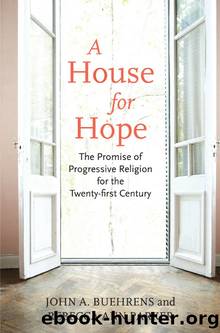A House for Hope by John A. Buehrens

Author:John A. Buehrens
Language: eng
Format: epub
Publisher: Beacon Press
Published: 2011-03-15T00:00:00+00:00
Part 4: The Foundations
Chapter 7: The Rocks Will Cry Out
Rebecca Parker
The most ancient shrine described in the Bible was a rock. As the story is told in Genesis, Jacob founded the shrine because of a dream. Traveling alone, he fell asleep one night in the mountains, with his head resting on a stone for his pillow. Perhaps it was one of those bright nights when the stars are thick and close, like a spangled quilt thrown over the earth. He dreamed he saw a ladder connecting heaven and earth, with angels climbing up and down. âThis is none other than the house of God and the gate of heavenâ he exclaimed when he woke. He set up the stone to mark the place and named it Beth Elâthe House of God. Another night, on another journey, Jacob tossed and turned in fear that his brother, whom heâd wronged, might kill him. An angel came in the darkness and fought him. Jacob survived the fight but limped ever after, and he gained a new nameâIsrael, which means âone who struggled with God and lived.â
The divine-human encounter is the rock on which our theological house stands. At the heart of liberal theology is a mysterious glimpse, a transforming struggle, with the oblique presence of God. âTheologyâ literally means âGod-talkâ and derives from theos (God) and logos (word). But talk of God is tricky business. The same Bible that tells of Jacobâs marking stone also warns, âMake no graven images of God.â God may be sighted by a sidewise glance, sensed in a dream, felt in a struggle, heard in the calm at the heart of a storm, or unveiled in a luminous epiphany. But the moment human beings think they know who God is and carve their conclusions in stone, images of God can become dangerous idols. In Jewish tradition, God is ultimately un-nameable, and some never pronounce the letters that spell out Godâs unspeakable name.
In liberal theology, at the core of the struggle with God is a restless awareness that human conclusions about God are always provisional, and any way of speaking about God may become an idol. This is why not everyone welcomes talk of God. God-talk has been used to hammer home expectations of obedience, to censure feelings and passions. It has been invoked to stifle intellectual inquiry and to reinforce oppression. For many people the word âGodâ stands for conceptions of the ultimate that have harmed life, sanctioned unjust systems, or propelled people to take horrific actions âin the name of God.â
âIf this is God,â black religious humanist William R. Jones commented in a conversation considering white Christianityâs standard concepts of God, âhe is my enemy. My sincere obligation is to fight him.â Jonesâs book Is God a White Racist? contends that images of God have functioned to justify slavery and lynching rather than to alleviate black suffering. In Facing the Abusive God, Jewish theologian David Blumenthal reflects that for many Jews it became impossible to accept the existence of God after the genocide of World War II.
Download
This site does not store any files on its server. We only index and link to content provided by other sites. Please contact the content providers to delete copyright contents if any and email us, we'll remove relevant links or contents immediately.
| Baha'i | Cults |
| Demonology & Satanism | Eckankar |
| Egyptian Book of the Dead | Freemasonry |
| Messianic Judaism | Mysticism |
| Scientology | Theism |
| Tribal & Ethnic | Unitarian Universalism |
The Four Agreements by Don Miguel Ruiz(5534)
Breaking Free by Rachel Jeffs(3631)
The Hatha Yoga Pradipika (Translated) by Svatmarama(2501)
120 Days of Sodom by Marquis de Sade(2447)
Member of the Family by Dianne Lake(2037)
The Tao of Physics by Fritjof Capra(1861)
The Psychedelic Gospels: The Secret History of Hallucinogens in Christianity by Jerry B. Brown(1830)
The Road to Jonestown by Jeff Guinn(1745)
Uriel's Machine by Christopher Knight(1627)
Going Clear by Lawrence Wright(1578)
Going Clear: Scientology, Hollywood, and the Prison of Belief by Lawrence Wright(1576)
The Grand Grimoire: The Red Dragon by Author Unknown(1420)
The Gnostic Gospel of St. Thomas by Tau Malachi(1415)
Key to the Sacred Pattern: The Untold Story of Rennes-le-Chateau by Henry Lincoln(1353)
The Malloreon: Book 02 - King of the Murgos by David Eddings(1311)
Waco by David Thibodeau & Leon Whiteson & Aviva Layton(1298)
The New World Order Book by Nick Redfern(1260)
The Secret of the Temple by John Michael Greer(1223)
The Initiatory Path in Fairy Tales by Bernard Roger(1180)
